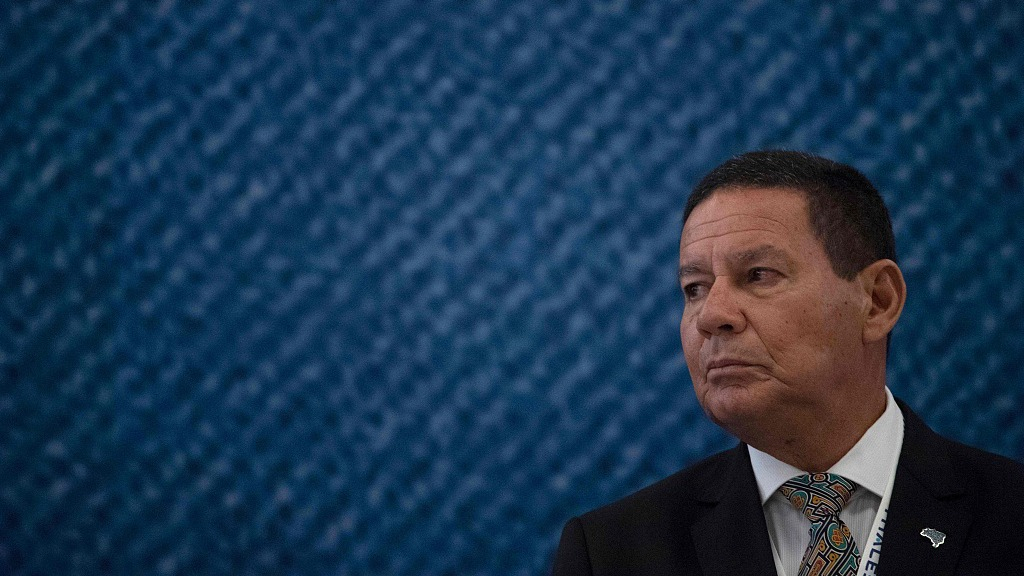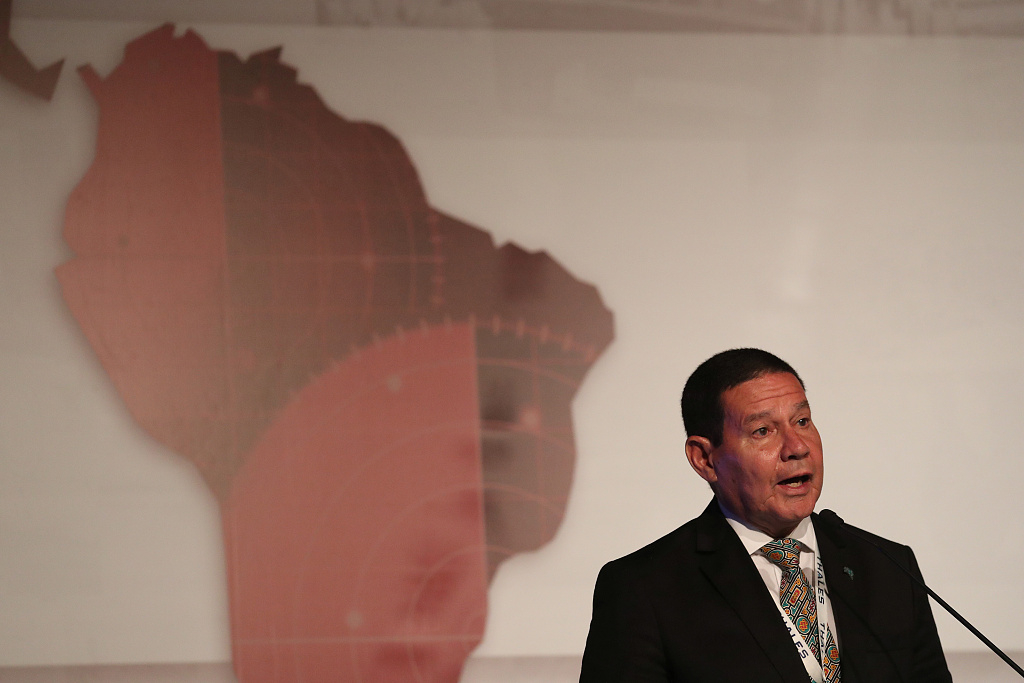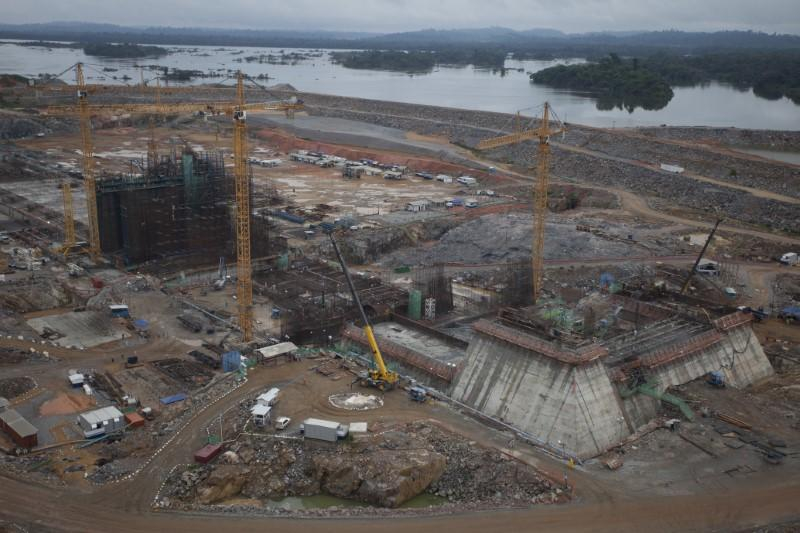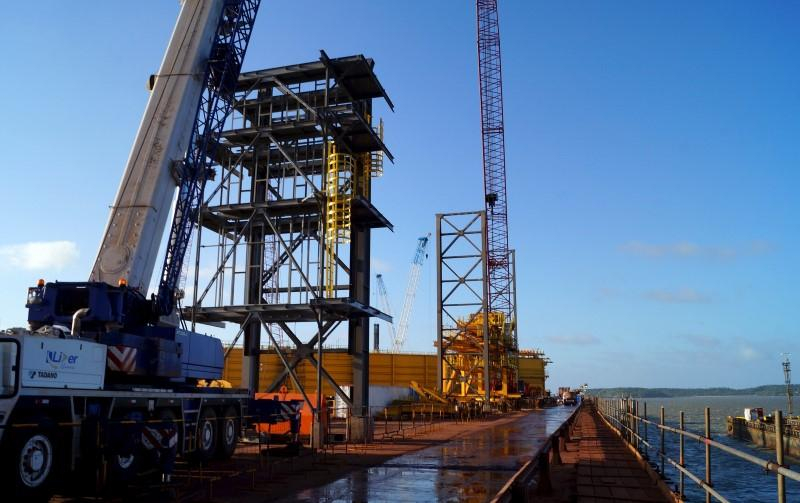
Domestic
07:28, 18-May-2019
What to look for in Brazilian vice president's visit to China
By Le Tian

China and Brazil will hold their new round high-level political and economic talks since 2015 during Brazilian Vice President Hamilton Mourao's visit to China next week, the Chinese foreign ministry confirmed on Wednesday.
According to the Chinese foreign ministry, Mourao will pay an official visit to China from May 19 to 24. President Xi Jinping and the CPPCC Chairman Wang Yang will meet with him. Vice President Wang Qishan will hold a welcome ceremony and banquet for him.
Mourao will also attend economic and cultural events in Shanghai.

Brazil's Vice President Hamilton Mourao delivers a speech during the opening of LAAD, the biggest military industry expo in Latin America, in Rio de Janeiro, Brazil, April 2, 2019. /VCG Photo
Brazil's Vice President Hamilton Mourao delivers a speech during the opening of LAAD, the biggest military industry expo in Latin America, in Rio de Janeiro, Brazil, April 2, 2019. /VCG Photo
Important partners
Mourao, a former general, in an April interview noted Brazil does not view China as a strategic threat and believes that this country is an important partner.
Established in 1974, the diplomatic relationship between China and Brazil has grown more solid and mature in its 45th year now.
Brazil is the first developing country to establish strategic partnership and the first Latin American country to establish comprehensive strategic partnership with China.
Bilateral trade has kept growing. China remained Brazil's largest trading partner since it overtook the U.S. in 2009, and is also its largest export market and largest source of import.

The high-level committee
The Chinese foreign ministry also said that the Chinese vice president will co-chair the fifth meeting of the China-Brazil High Level Coordination and Cooperation Committee (COSBAN) with Mourao.
The COSBAN was created in 2004. Two years later, the committee held its first meeting.
The COSBAN is the mechanism for political and economic dialogue at the highest level between Brazil and China, which guides bilateral relations, sets new goals for their future and promotes bilateral practical cooperation.
Its structure is composed of eleven subcommittees, which cover the entire spectrum of bilateral relations.
Belt and Road cooperation
Mourao said in an interview on May 13 that Brazil has expectations for the Belt and Road Initiative (BRI) and is willing to hear China's advice on cooperation.
He regarded his visit a chance to give a political message on Brazil's position on the BRI.
For the Chinese side, the foreign ministry on Wednesday said China remains open to and welcomes Brazil's participation in the BRI and is ready to discuss with Brazilian ways to create synergy between two sides' development plans for greater connectivity, common development and win-win results.
Two BRI-related projects are underway: the ultra extra high voltage system to transport clean energy from the Belo Monte Dam to southeast Brazil, and the São Luís Port in the northeast region.

The site of the Belo Monte hydroelectric dam, planned to be the world's third largest, in Pimental, near Altamira in Para state, November 23, 2013. /Reuters Photo
The site of the Belo Monte hydroelectric dam, planned to be the world's third largest, in Pimental, near Altamira in Para state, November 23, 2013. /Reuters Photo
Belo Monte Dam, as the second largest hydroelectric project in Brazil, uses Chinese transmission technology with an installed capacity of 11,000 megawatts. While Sao Luis Port, expected to be completed in 2022, will have an annual handling capacity of 10 million tons, 7 million of which will be grains and 1.8 million, oil products.
According to Mourao, Brazil, in addition to wanting to diversify exports of higher value-added products, intends to attract quality investments in infrastructure projects for ports, railways, highways and in renewable energy, such as wind and solar.
Chinese investments in Brazil are growing. The Brazilian Planning Ministry said the investment has reached 54 billion U.S. dollars covering areas such as banks, infrastructure and agribusinesses.
Chinese ambassador to Brazil Yang Wanming also said China could agree to allow more Brazilian meat imports following high-level talks in a recent interview.

The dock capable of loading the largest iron ore ships in Sao Luis, Brazil, September 17, 2015. /Reuters Photo
The dock capable of loading the largest iron ore ships in Sao Luis, Brazil, September 17, 2015. /Reuters Photo
In 2017, China imported from Brazil 23 billion U.S. dollars of agricultural products, 30 percent of total Brazilian exports in this category. China purchased more than 50 million tons of soybeans, almost 80 percent of the total exported from Brazil, according to the ambassador.
The diplomat also noted the purchase by China of more than 560,000 tons of beef, approximately 40 percent of the Brazilian total, and the increase in the purchase of poultry meat.
(With inputs from agencies)

SITEMAP
Copyright © 2018 CGTN. Beijing ICP prepared NO.16065310-3
Copyright © 2018 CGTN. Beijing ICP prepared NO.16065310-3